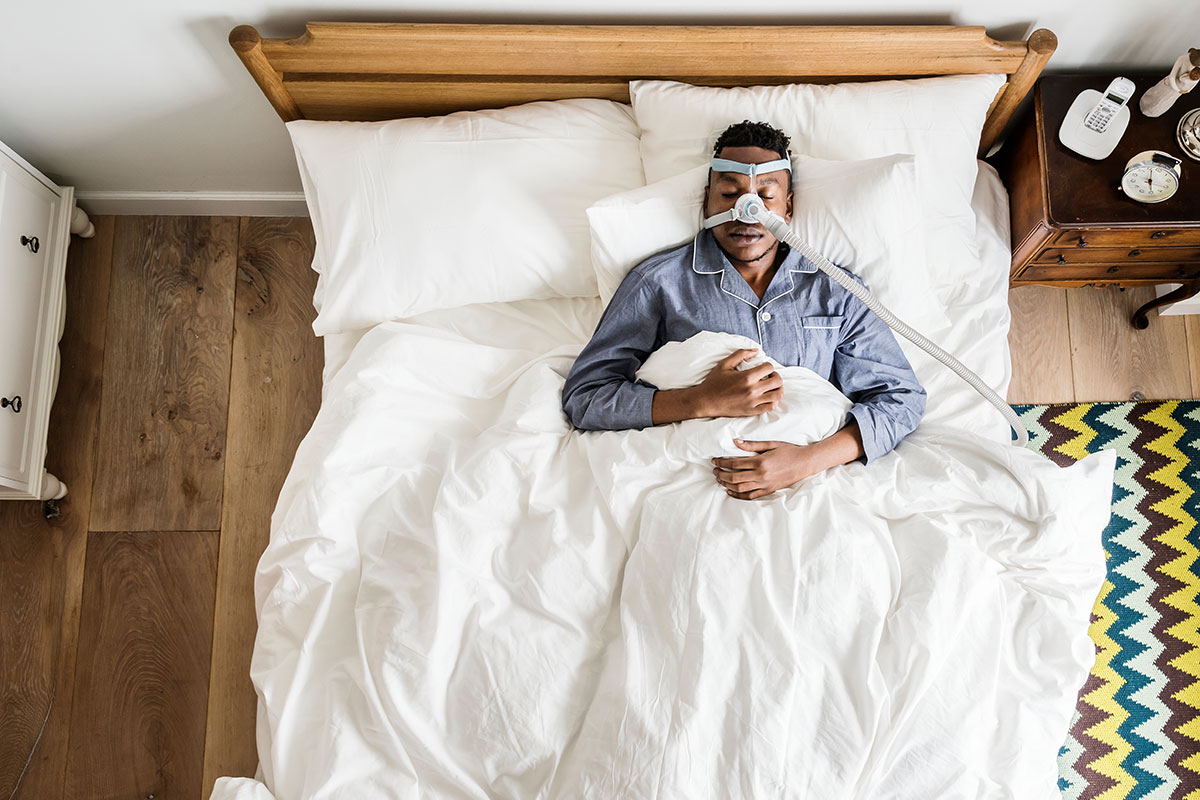
Snoring or sleep apnoea – which is it?
You know you snore – whether you’re aware of it yourself or your sleeping partner tells you. But how do you know if you have sleep apnoea? Is there a difference? Does it even matter?
Yes. It does matter.
While they are closely associated, there is a big difference between snoring and sleep apnoea. It’s important to understand the difference, to know where they overlap, and what danger signs to be alert to. You also need to know which condition you experience and how to manage each. Your health, well-being, and longevity will depend on it.
What is Snoring?
Snoring happens because the soft tissues of the nasal cavity, mouth, and throat relax too much during sleep. This causes the airways to narrow. As you breathe, these soft tissues vibrate and the typical snoring sound results. Almost 50% of men and 30% of women habitually snore.
Snoring can be caused by a vast number of factors, including but not limited to:
- Nasal congestion (due to allergies or a virus)
- Sinus infection
- Deviated septum
- Large tonsils
- A large uvula
- Being overweight or obese (especially fat in the neck)
- Drinking alcohol
What is Sleep Apnoea?
Also a common disorder, obstructive sleep apnoea (OSA) causes the airways to collapse and become blocked during sleep. It results in the cessation of breathing for as many as 20-30 seconds to minutes at a time before the sufferer wakes gasping for air. This can happen dozens of times every night and for some, it can occur thirty times an hour.
Anyone can suffer from OSA but it’s more common in men and in people who are overweight.
Snoring and Sleep Apnoea – Where Do They Overlap?
Snoring and sleep apnoea do overlap. Not all snorers have sleep apnoea, but all people with sleep apnoea snore.
Warning signs that your snoring may indicate sleep apnoea include:
- You are a loud sleeper. The noisier you are, the more likely you have sleep apnoea. This noise includes snoring, gasping, and snorting.
- Your sleep partner notices your snoring sounds are associated with significant, noticeable pauses in your breathing – these may occur repeatedly through the night.
- You are a restless sleeper. Sleep apnoea sufferers tend to toss and turn at night; thrashing, jerking and kicking, and failing to achieve a restful night’s sleep.
- Chronic tiredness. Are you always tired? Do you nod off while reading or watching TV? Do you desperately crave an afternoon nap most days? Do you have trouble concentrating during the day? Are you cranky or headachey when you wake? Do you catch a lot of colds?
If you snore as well, you may have sleep apnoea.
You are also at higher risk of having OSA if you:
- Are male
- Are a postmenopausal woman
- Are overweight or obese
- Have a family history of OSA
The Difference Between Snoring and Sleep Apnoea
Snoring is a major symptom of sleep apnoea. The difference between snoring and sleep apnoea is that, in OSA, snoring is punctuated with significant pauses in breathing. This happens because breathing literally stops (for several seconds to minutes) as the airway collapses and blocks. As breathing recommences, the OSA sufferer will snort, gasp, or choke. They’ll likely not be aware this is happening and will go back to sleep.
You likely have no idea you have sleep apnoea, unless your sleep partner or another family member alerts you to your pattern of snoring, gasping, and stopping breathing.
Health Consequences
Snoring is disruptive to sleep and carries an array of physical, emotional, mental, and social implications, from daytime irritability to tiredness, a need for napping, diminished cognitive performance and concentration, memory issues. Anxiety, headache, weight gain, and an increased risk of workplace and traffic accidents also ensues. Over time, your risk of developing chronic health conditions increases as well.
Sleep apnoea also results in all of these, but the health implications are significantly greater. Untreated obstructive sleep apnoea dramatically increases your likelihood of experiencing:
- Obesity
- Irregular heartbeat (arrhythmias including atrial fibrillation)
- Driving accidents
- Work-related accidents
- High blood pressure
- Stroke
- Cardiovascular disease and heart attacks
- Diabetes
- Certain cancers
You’re at higher risk of insomnia at night and micro-sleeps during the day, which is particularly dangerous while driving or operating machinery.
If you have any of the warning signs of sleep apnoea, or you have any reason to suspect your snoring may not be “just snoring”, you need to see your doctor. They will take your complete medical and family history and check your nose, mouth, and throat. You’ll be weighed and your BMI will be calculated.
There is no blood test for sleep apnoea and it can’t be detected during a routine physical examination. The doctor may refer you for a formal sleep study. The lab-based sleep study will characterise your breathing patterns, eye movements, heart rate, blood pressure, oxygen levels, and brain activity during sleep, as well as your wake-sleep cycles and identify your risks. A home-based portable monitor may alternatively be used.
You may also be asked to keep a sleep diary.
Diagnosis of sleep apnoea is critical for proper management to maintain your health and improve your sleep. Management approaches for sleep apnoea may include:
- alcohol avoidance
- losing weight
- quitting smoking
- regular exercise
- side sleeping
- raising your head while sleeping
- a mandibular advancement device such as SnoreMD for mild to moderate sleep apnea recommended by your health professional
- surgery (tonsil removal, septum repair, etc)
- CPAP machine
SnoreMD – Top Anti-Snoring Device
As mentioned previously, sleep apnoea is a severe medical condition that requires a medical diagnosis by your general practitioner, an ear/nose and throat specialist, or a sleep specialist.
Learn more about how to treat sleep apneoa.
SnoreMD is a top anti-snoring device that is the perfect snoring solution. Discover how it can work for you to improve the quality of your sleep (and that of your partner!). Find out more information on our FAQs page and visit our news page for a wealth of information about better sleep health and habits.
Buy SnoreMD online now or call us on 07 5370 9323.


